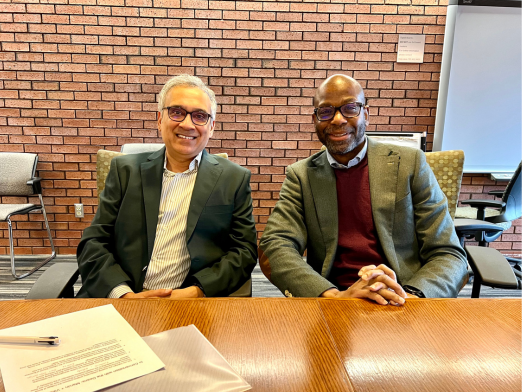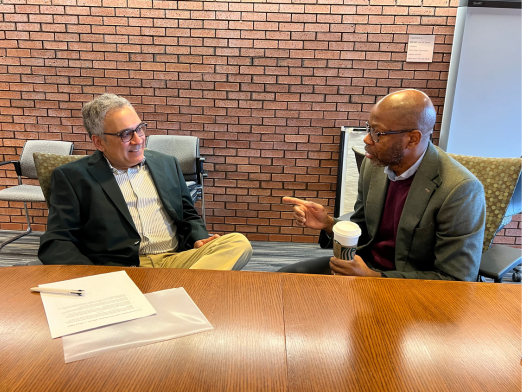In Conversation: A chat between Dean Marvin Washington and Dean Vikas Mehrotra
Caroline Gault - 4 April 2024

Following February's candid conversation with Faculty of Arts Dean Robert Wood, Marvin Washington, Dean of the College of Social Sciences and Humanities (CSSH), sits down with Dean Vikas Mehrotra to talk business—that is, the Alberta School of Business (ASB).
From current and prospective projects to fostering collaboration and teamwork, they also shed light on the advantages of the college model. What’s revealed throughout is a dynamic professional relationship steeped in history and rich with memorable teaching moments. Plus: learn what these two deans get up to when they’re not on campus.
Can you highlight any ongoing collaborative projects between the College and the Alberta School of Business? How do you see these collaborations contributing to the overall academic landscape at the University of Alberta
Vikas Mehrotra (VM): There are many projects currently in the works and at different stages, but let me start with one that is ongoing: the Peter Lougheed Leadership College (PLLC) initiative. This is an embedded leadership certificate initiative that we are collaborating on with the CSSH. We also have a new director for the PLLC, Richard Field from ASB, who was appointed in the fall. We believe this initiative has the potential to inspire the creation of additional embedded certificate programs across the university.
Marvin Washington (MW): I think this is such a great example of how colleges and faculties can work together. Vikas, the School of Business and former PLLC academic lead Leo Wong did a wonderful job of re-imagining PLLC and what the courses and certificate could be. Then when the college model came around, we said, we can imagine that and so much more. We needed more attention, more focus, and Leo had a full-time job. So, then it was about finding a person that had passion for this as well, who could devote more time and more effort to it. That's how we transitioned to Richard Field.
When initiatives are housed in one faculty, it can be easy to think that they're only intended for that faculty. But in many cases, that’s not true. PLLC isn’t just a business thing; there's interdisciplinary courses, it goes across the university. And the scale of it says a lot. We are getting thousands of people in the first class. We're going to end up with hundreds of people in the certificate, which is far more than previous iterations. Do we also do a graduate level certificate? Do we do a master's of leadership? There are lots of wonderful ideas.
As a former professor and past chair of the Department of Strategy, Management and Organization at ASB, how is Marvin’s years of experience at ASB leveraged in the working relationship between college and faculty?
MW: I've been really sensitive to the college's relationship to the faculty. I think that, having spent 15-16 years in ASB, I’ve been keenly aware that it's my job to support the dean of the business school, not to become the dean of the business school. There is no need for Vikas to run with my idea. Vikas has his own ideas and he runs what he wants to run.
The community aspect is also interesting. Because as someone who has been in the business community — I taught in the executive education portfolio, and as an associate dean before — I think that's where I can be the biggest ally. As the college dean, I'm often in spaces with the business community where I can advocate for what Vikas is doing in ASB. I think it's worked well.
VM: Honestly, it has worked really well and Marvin is being too humble here. Having someone who understands a business perspective at the college level is really helpful for us. And so I've been forward enough to ask for advice whenever I can, I don't shy away from that.
Looking ahead, are there specific areas of synergy or potential joint ventures you’re particularly excited about exploring between CSSH and ASB?
MW: As a professional school, it is really easy for business to do its own thing — and business is great at doing its own thing. It has its own community. Now that I'm in the role of college dean, it's really easy to see the connections where business can actually support university initiatives. A perfect example of one is the eHUB Entrepreneurship Centre. It was, frankly, never designed to be only a business thing, but, again, it had to be housed somewhere before we had the college model. As innovation across the campus — and entrepreneurship generally — is becoming more of a strategic focus, part of my role has been playing a sort of broker-advocate. Whenever I hear the words “innovation” and “entrepreneurship”, I say, “Before you all go too far down that path, we have something you should see. Let's go visit eHUB.”
VM: Yes, I totally agree that eHUB is a good example of something that can be shared at the college level. And because entrepreneurship spans different faculties, interest could easily come from students who are in medicine. Then we have the leadership certificate. We also have in mind a university-wide “finance for founders” course that would be as helpful in engineering or medicine or education as it would be in the business school. We could approach the college to help us with something like that, as really the best place to house it would be the college.
Also relevant is the Centre for Cities and Communities (CCC). I want this to be a pan-university affair. I want this to be a city's institute that is structured like a think tank. This think tank would be like the Tao of Cities. It would be the “everything” of cities, which means that if you were to draw concentric circles, you’d see that, for e.g., real estate plays an important role in cities, but it’s not just about real estate, it’s not just commercial activities. It's also libraries; it’s also public safety; it’s also urban planning; it’s also transportation, which is in the science faculty; it's also infrastructure, which is in the engineering faculty; it's also mental health, which is in the medicine faculty. It's an amalgam of all of this. This is a prime example of something that can span several faculties in this university, and we have already got a seed funding of about $5 million for this. At this point, we are looking for someone who can be at the helm of it, who's able to work across different faculties. That's our new challenge.
MW: And as Vikas is imagining the centre, that's where the college can help bring reality to the vision. Is there someone that can help figure out how we actually set this up? What do we need to do in terms of the board? What do we need to do in terms of governance structure? There are a bunch of i's to be dotted and t's to be crossed. Again, this is a perfect example of when business will — I have no doubt — figure it out, but the speed at which they figure it out could be quicker with support from the college.

Both of you have extensive experience as educators in ASB. Could you share a memorable teaching moment or an experience that has significantly influenced your approach to education?
MW: So, this is the story of how I met Vikas: I taught a capstone class in strategy in 2008-2009. The design of the class pulled together all the different disciplines. I brought in someone to talk about how strategy connects to things like marketing, change management and finance. Vikas was the finance person.
I presented to the class a new case from Victoria for Rogers Chocolate — the name of the case has changed since. They had to hire a new CEO and they wanted to grow the business by 200% in 10 years — some crazy number that sounds easy. I said to the class, give me all the crazy ideas, and the students gave all the crazy ideas. As you can imagine MBA students would do, they’d go to China, they’d do this, they’d do that. Well, Vikas comes in the next day and he says, “Those are crazy ideas. Now, how are you gonna pay for it?”
And the room went silent. It was the best. It was like, yes, this is exactly what I wanted the MBAs to experience. It’s so easy to invent ideas when you have no connection to the finances. But how is the business actually going to pay for all the crazy ideas you come up with? It worked wonderfully. It was such a connection point. I got to learn about Vikas’ take on finance, and as for the students, they talked about this experience in their evaluations.
VM: That was an eye opener for me, too. This is what happens when your silos are too comfortable. And that's where we were, we were really super-comfortable in our beautiful silos. When I sat in Marvin's class listening to him talk about strategy, it opened my eyes because in finance we assume these things drop out of the heavens. But no, you have to work with them, you have to actually devote time and effort to devising a strategy. In finance, we tend to assume that's the least of your worries.
I'm going to add one more thing to this memorable teaching moment question: When you come in as a fresh PhD, minted from some good university in the US or Canada, you are cobbling with all of the stuff that you've learned and you want to regurgitate all of that to students. But what’s missing? Speaking from experience — with more salt than pepper in my hair right now — I’ve come to understand that the pivotal question is actually: What is the big picture? Even for simple things, like asking yourself what the purpose is behind some analysis you’re doing. There is not one eureka moment where you realise you need to look at the big picture. It kind of happens over time. And that's when you feel a classroom buzzing, when you have made that connection.
As leaders managing demanding careers and family responsibilities, could you share any hobbies or activities outside of work that bring you joy and relaxation?
MW: I coach girls basketball, anywhere from ages 8 to 16. With girls, you spend much of your time saying, “Please shoot, you’re better than you think.” I'll have a girl that will make four baskets and won't shoot anymore because she's worried what other girls will think about her. With boys, there can be a sense of overconfidence, in fact, and they have a harder time listening as a generality. Not every kid, but girls are often more shy in a competitive environment. So, I feel like I'm trying to bring something out of them.
For me, coaching uses a totally different side of my brain. I love the chess part of it; we're in a game, we're down by one or two, how do we turn it around? How do we help people manage their nerves? I really like that part. It's just a different world for me. It allows me to not be defined by “professor” or “dean” at the university or college. No 12-year-old calls me Dr. Washington. They sort of expect me to be goofy. They expect me to run around and do silly games. It’s a totally different energy than when I'm in a meeting with other faculty deans and college deans.